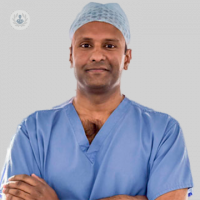An expert explains: Can problems affecting the bladder be prevented?
Autore:There are a number of conditions which can affect the bladder and cause unpleasant symptoms such as increased urgency to urinate, a burning sensation when doing so or general discomfort. In this detailed guide, highly respected consultant urologist Mr Nikesh Thiruchelvam offers expert insight on the most common problems affecting the bladder and also explains how each condition is diagnosed and treated. The renowned specialist also details if some people are more prone to developing bladder problems than others and gives advice on lifestyle modifications that promote bladder health.

What are the most common bladder problems?
Common bladder problems include malignant causes such as bladder cancer and benign causes such as bladder stones, the overactive bladder, bladder inflammation from infection or bladder pain and bladder failure, causing urinary retention.
How do you know if the problem is related to your bladder?
Bladder problems usually cause local bladder symptoms. This may include blood in the urine, pain on voiding (urinating) as well as passing urine more frequently and with urinary urgency.
If you have urinary retention, you can’t pass urine and this is sometimes associated with a strong desire to pass urine but the inability to pass urine at all. You can also experience pain in the bladder area (located just above the pubic bone in the midline) and sometimes pain along the water pipe (the urethra).
Who is most likely to suffer from bladder problems?
As common with the human body, problems become more common as you age! The overactive bladder typically causes problems from around forty years of age and becomes more frequent with increasing age. The peak age for bladder cancer is in the over eighty-five year age group.
Recurrent urinary tract infection in women can occur at any age, as can painful bladder syndrome. Urinary infections in men are uncommon and should be investigated. Urinary retention from bladder failure usually also occurs in the elderly but can also affect a group of women from twenty to forty years of age - known as Fowler’s syndrome, which is thought to be related to the urinary sphincter continence mechanism in the water pipe being too tight.
What are typical symptoms of a bladder problem?
The overactive bladder causes urinary frequency, urgency and getting up at night to pass urine. Urine infection causes urinary frequency, urgency and pain or burning in passing urine.
Bladder pain syndrome causes pain in the area that is relieved by emptying the bladder, hence patients go frequently passing small volumes. Bladder stones and bladder cancer can cause urinary frequency and urgency, bladder pain and blood in the urine. In bladder failure, patients cannot pass urine.
These problems described are typical symptoms but sometimes patients can have bladder problems but have very little in the way of symptoms so it is important to get checked out if you have any concerns.
How is a bladder problem diagnosed and treated?
Urgent investigation is needed if you have noticeable blood in the urine or bladder pain because it is important to undertake a look in the bladder (with a telescopic test through the water pipe - a cystoscopy) and some form of kidney radiology imaging, such as with an ultrasound or CT scan. A bladder stone is treated by passing a telescope into the bladder and using a laser to break up the stone (cystolitholopaxy).
Bladder cancer is usually treated by cutting the bladder cancer tissue away using a telescope through the water pipe (transurethral resection of bladder tumour) but sometimes treatment is needed to place medicine into the bladder (intravesical treatment for bladder cancer) or more aggressive cancer treatment is necessary such as with radiotherapy or removal of the bladder (radical cystectomy).
The overactive bladder is investigated by undertaking a pressure test on the bladder to confirm the diagnosis (called urodynamics) and can be treated with medication, Botox injection into the bladder or by fitting a pacemaker for the bladder (sacral nerve stimulation).
Recurrent urinary tract infection is also investigated by the telescopic examination of the bladder and an ultrasound of the kidneys and is treated by taking a daily preventative low dose antibiotic, a different non-antibiotic medication called Methanamine or by medication instilled into the bladder.
Bladder pain syndrome is a diagnosis of exclusion meaning that all of the above mentioned investigations need to occur to exclude other problems. The condition requires multi-speciality and multi-modal therapy with pain services, medications by mouth or directly instilled into the bladder and sometimes, removal of the bladder.
Can bladder problems be prevented?
There are some lifestyle modifications that help bladder problems. If urinary tract infections commonly occur after sexual intercourse, asking your partner to clean beforehand and for you to urinate after intercourse can help, as does a single low dose antibiotic after sex (‘post-coital antibiotics’).
Plenty of fluids can help prevent infections and as does cranberry juice or concentrated tablets. Wiping from front to back after going to the toilet may also help prevent infections. Holding on and voiding (urinating) infrequently may increase your chance of urinary tract infections and should be avoided.
Patients often notice certain foods can cause bladder irritation (such as acidic foods like citrus fruits or tomatoes, spicy foods or fizzy drinks) and avoidance of these substances can help. If you have an overactive bladder, try to increase the time interval between visiting the toilet (bladder retraining) and avoid caffeine-containing drinks such as coffee, tea and energy drinks.
Some medications can increase your urine output as a side effect so it is of value to discuss your medication list with your GP if this is causing bladder problems. Smoking is closely linked to bladder cancer and seeking help to stop smoking is strongly encouraged.
Mr Thiruchelvam is a highly experienced consultant urologist who specialises in all aspects of urinary dysfunction and treatment. If you would like to learn more about Mr Thiruchelvam or wish to schedule a consultation about concerns about a bladder problem, you can do so by visiting his Top Doctors profile.


